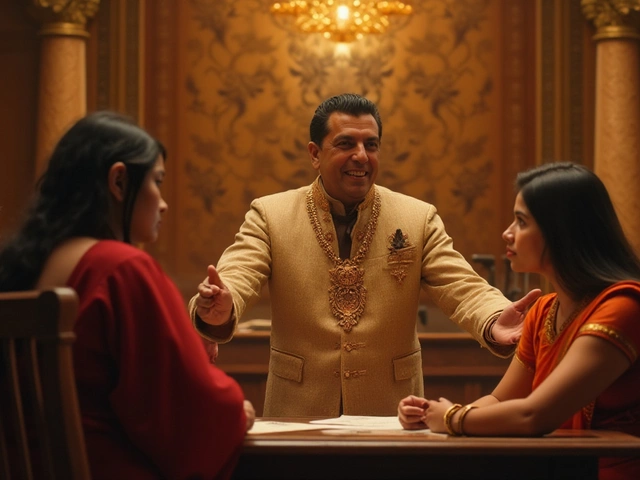Divorce in India can be a time-consuming process due to the complexity of the legal system and the emotional aspects involved. However, understanding the available options can significantly simplify your journey to legal separation.
The fastest way to proceed is often through mutual divorce, which requires both parties to agree on the split. This method is not only cost-effective but also less stressful compared to contested divorce.
In this article, we will discuss various approaches, starting with identifying the appropriate type of divorce for your situation, keeping in mind the cultural and legal differences that might affect your case. Additionally, we will shed some light on efficient legal proceedings and how mediation can play a crucial role in expediting the process. Lastly, selecting a proficient legal representative can make all the difference when navigating through this challenging period. Armed with the right information and resources, a quicker path to starting anew is achievable.
- Understanding Divorce Types
- Navigating Legal Requirements
- Role of Mediation
- Choosing the Right Lawyer
Understanding Divorce Types
In India, understanding the various divorce types is crucial for navigating the legal landscape effectively. The Indian legal system primarily recognizes two kinds of divorces: mutual consent divorce and contested divorce. Each type has specific requirements, implications, and timeframes that can significantly influence the process's duration and complexity. A mutual consent divorce is typically faster as it involves both parties agreeing to terminate the marriage amicably, streamlining the legal hurdles. In contrast, a contested divorce can become a prolonged affair due to disagreements between spouses on issues such as alimony, child custody, or property distribution.
The process for a mutual consent divorce is relatively straightforward. According to section 13B of the Hindu Marriage Act, this type of divorce requires couples to live separately for at least a year before filing a joint petition. This separation period is legally mandated to ensure that the decision is well considered and not taken in haste. After filing, the couple must make appearances before the court, usually twice, to confirm their intent. If all the conditions are fulfilled, the court may grant a divorce in a matter of 6 to 18 months. In this procedure, having a well-drafted agreement covering all aspects—child custody, maintenance, and asset division—can expedite matters significantly.
In the case of a contested divorce, expect a more complicated process. This type often arises when one party refutes the other's claims or doesn't wish to dissolve the marriage. Common grounds for contested divorce include cruelty, adultery, desertion, and conversion to another religion. The petitioner must prove these charges for the court to grant a divorce. The process is lengthier as it involves evidence presentation, witness examination, and may even include custody battles or disputes over asset division. A contested divorce may stretch over several years, depending on the court's backlog and the complexity of the case. A quote from the well-known family law expert, Anil Malhotra, encapsulates this clearly:
"Contested divorces can be emotionally and financially draining, often turning what was once amicable into an arduous battle of attrition."
Another less common pathway is an ex-parte divorce, available when one spouse unilaterally refuses to participate in the proceedings despite being sent notices. In such scenarios, if sufficient evidence is presented, the court can grant a divorce in the absentee's favor, although the estranged party commonly has the right to challenge the decree within a specific duration.
Here's a statistic to consider: nearly 90% of divorces in India are filed on grounds of mutual consent, reflecting a growing societal acceptance of dissolution as a solution to irreparable marital discord. Despite this, awareness and understanding of these processes remain limited, especially in rural areas where stigma and lack of access to legal resources are prevalent. To make an informed decision, consulting with a knowledgeable divorce lawyer who can guide through these intricacies is essential. This ensures that the process aligns with personal needs while also respecting legal protocols.

Navigating Legal Requirements
In India, the legal journey to achieving a divorce can be intricate and multifaceted. Understanding the legal requirements is crucial for anyone aiming for a quick divorce. Typically, the process begins with filing a petition in a family court. Mutual consent is the preferred method as it tends to be less contentious. However, it necessitates both parties agreeing on aspects like child custody, alimony, and property distribution.
The legal framework outlines several grounds for divorce, with the Hindu Marriage Act, 1955, being relevant for Hindus, Jains, Sikhs, and Buddhists. Couples must file a joint petition when seeking a mutual separation. This requires a written agreement that details the terms agreed upon by both parties. Following its submission, the court may grant a six-month period called the 'cooling-off period', which has been flexible recently. Interestingly, a Supreme Court ruling in 2022 allowed waivers for this term, recognizing the need for a faster resolution in some circumstances.
Navigating these processes can often seem overwhelming, but hiring an experienced divorce lawyer can make a significant difference. These professionals guide their clients through the documentation requirements, which include submitting marriage certificates, various government identification, and financial disclosures. They ensure all paperwork is meticulously prepared to avoid unnecessary delays. With expertise in the Indian legal landscape, they can also counsel clients through the emotional trials that often accompany such significant life changes.
"India's divorce laws prioritize conciliation and mediation, emphasizing the importance of peaceful resolution," notes Justice Lalit of the Supreme Court, underscoring the country's approach to legal separations.
To aid in faster processing, couples should maintain transparency in financial obligations and agreements concerning child care. Any false statements can lead to reversals in court proceedings, counteracting efforts to expedite the process. It is also wise for spouses to explore mediation before heading directly to court. Many a time, mutual understanding achieved outside the courtroom can resolve disputes faster than formal legal intervention.
A strategic approach, combined with professional guidance, can significantly impact the duration and success of divorce proceedings in India. Proper understanding and adherence to legal prerequisites form the backbone of a swift dissolution of marriage, providing individuals the opportunity to begin anew with clarity and peace.

Role of Mediation
Mediation plays a pivotal role in expediting the divorce in India, particularly in mutual divorce cases, where the intention is to separate amicably and without undue stress. Mediators act as neutral facilitators, guiding both parties to communicate effectively and reach a consensus on matters such as alimony, child custody, and division of property. By employing mediation, couples can often avoid the lengthy, and sometimes contentious, courtroom battles that define contested divorces.
The process of mediation involves structured sessions where both parties, with the mediator’s assistance, explore potential resolutions. This approach not only saves time and legal expenses but also fosters a less hostile environment, which can be beneficial, especially when children are involved. According to a survey by the Mediation and Conciliation Project Committee of the Supreme Court of India, mediation successfully resolves disputes in about 70% of the cases it handles, proving its effectiveness.
In many instances, mediation reduces emotional tension and promotes cooperative decision-making. It’s worth noting that the mediators selected are often lawyers or experienced professionals in family therapy, ensuring that the guidance provided is both legally sound and emotionally considerate. A mediator's soft skills are crucial, helping parties understand the consequences of their decisions while maintaining a focus on achieving a legal separation swiftly and smoothly.
Mediation also allows privacy, a stark contrast to the public nature of court proceedings. This is a significant advantage for those looking to maintain discretion and protect personal information. Moreover, in a diverse country like India, mediation offers the flexibility to incorporate cultural sensitivities, which might be overlooked in the more rigid court system.
"Mediation reduces the burden on courts and improves the quality of conflict resolution by involving parties more directly," said Justice B.N. Srikrishna, highlighting the solution-oriented nature of mediation.
Despite its benefits, mediation might not be suitable for all cases, particularly where there is a history of abuse or unequal bargaining power between the spouses. In such scenarios, relying on traditional legal channels with strong legal representation remains critical. However, for many, integrating mediation into the divorce process can significantly enhance both the speed and quality of their separation, providing a foundation for future interactions that are respectful and cooperative.

Choosing the Right Lawyer
When navigating the complex world of divorce in India, selecting the right lawyer can be the difference between a smooth transition and a prolonged legal battle. A competent attorney not only represents your interests but also understands the emotional turmoil inherent in such proceedings. Therefore, you should prioritize experience and specialization when making your selection. Lawyers who specialize in family law and have a track record of managing cases successfully in this niche are generally more adept at handling nuances and surprises that might crop up during the legal proceedings.
One crucial aspect to consider is the lawyer’s familiarity with the family court system in your jurisdiction. An experienced Indian divorce lawyer should be well-versed with the local family court's procedures as each jurisdiction can vary significantly. This local expertise often translates into an ability to anticipate potential hurdles and craft strategies that can keep the process moving forward swiftly. Client testimonials, reviews, and recommendations offer insights into the lawyer's capabilities and can help build trust.
Communication is another cornerstone in selecting a divorce lawyer. The lawyer should be willing to explain each step of the process clearly and be available to answer queries as they arise. Divorce proceedings are emotionally taxing, and a lawyer who understands the importance of keeping you informed and prepared at every stage can alleviate a lot of stress.
"A good lawyer is not just a legal counsel; they are your guide through an emotionally turbulent sea," as family law expert Maya Ramanathan suggests, highlighting the importance of empathy in legal representation.
Moreover, consider the costs associated with hiring a divorce lawyer. Transparency about their fee structure, whether it is hourly or flat, should be established upfront. Some lawyers may offer initial consultations either free of charge or at a nominal fee. These sessions can provide a feeling of whether the lawyer empathizes with your goals and if they're compatible with your expectations. Additionally, it's vital to discuss what other costs may be incurred, such as court fees and potential charges for additional legal services needed throughout the divorce process.
A lawyer's ability to negotiate effectively should not be overlooked, especially when dealing with a mutual divorce. Their negotiation skills can lead to settlements that save time, money, and emotional energy. To conclude, by taking the time to diligently research and assess potential lawyers, you can secure an ally who is equipped to not only advocate through the legal maze of divorce but also foster a constructive approach towards an amicable resolution.
| Factor | Importance |
|---|---|
| Specialization in Family Law | High |
| Local Court System Knowledge | High |
| Communication Skills | Medium |
| Fee Transparency | Medium |
| Negotiation Skills | High |


